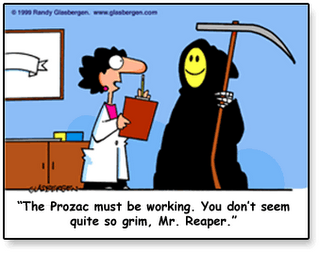On first blush, it may seem odd to suggest that talking about a depression will cause one. On the other hand, talking about depression spreads fear and more depression, so arguably there’s something to it. Which leads to the broader issue of whether the country is depressed in an economic or psychologial sense. Perhaps we should all get on Prozac and see if the economy picks up.
The Depression Narrative as a Self-Fulfilling Prophecy
Courtesy of Mark Thoma at Economist’s View
I don’t buy into the idea that talk is a major factor driving the length and depth of the downturn, but Robert Shiller does:
Can Talk of a Depression Lead to One?, by Robert Shiller, Commentary, Economic View, NY Times: People everywhere are talking about the Great Depression… It is a vivid story of year upon year of despair. This Depression narrative, however, is not merely a story about the past: It has started to inform our current expectations.
According to the Reuters-University of Michigan Survey of Consumers earlier this month, nearly two-thirds of consumers expected that the present downturn would last for five more years. President Obama, in his first press conference, evoked the Depression in warning of a “negative spiral” that “becomes difficult for us to get out of” and suggested the possibility of a “lost decade,” as in Japan in the 1990s. …
The attention paid to the Depression story may seem a logical consequence of our economic situation. But the retelling, in fact, is a cause of the current situation — because the Great Depression serves as a model for our expectations, damping what John Maynard Keynes called our “animal spirits,” reducing consumers’ willingness to spend and businesses’ willingness to hire and expand. The Depression narrative could easily end up as a self-fulfilling prophecy.
The popular response to vivid accounts of past depressions is partly psychological, but it has a rational base. We have to look at past episodes because economic theory, lacking the physical constants of the hard sciences, has never offered a complete account of the mechanics of depressions.
The Great Depression does appear genuinely relevant…, and many people have been spooked by the story.
To understand the story’s significance in driving our thinking, it is important to recognize that the Great Depression itself was partly driven by the retelling of earlier depression stories. In the 1930s, there was incessant talk about the depressions of the 1870s and 1890s; each of those downturns lasted for the better part of a decade. … Early in the Great Depression, people were concerned that, as one observer put it in 1931, we may “pass through a long period of mediocre business activity like that of the 1890s.” …
Should President Obama have reinforced the Great Depression story? Perhaps he had to take that risk to promote the economic stimulus plan, and not just hope for some accident to save us. The story was already entrenched in our consciousness, and will be with us until we see a real, solid boost from the stimulus package and its likely successors.
*****
Robert James "Bob" Shiller is an American economist, academic, and best-selling author. He currently serves as the Arthur M. Okun Professor of Economics at Yale University and is a Fellow at the Yale International Center for Finance, Yale School of Management. Shiller has been a research associate of the National Bureau of Economic Research (NBER) since 1980, was Vice President of the American Economic Association in 2005, and President of the Eastern Economic Association for 2006-2007. He is also the founder and chief economist of the investment management firm MacroMarkets LLC. Shiller is ranked among the top 100 economists of the world. Wikipedia.



